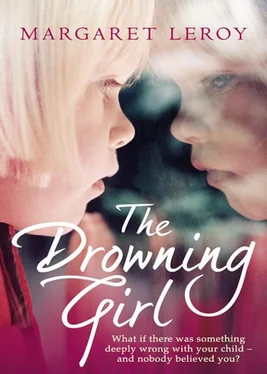‘Flowers for Claudia Runcie,’ I said.
He was looking at me; he didn’t look at the flowers. He still had that pleased, amused air.
‘Well,’ he said.
He took the basket from me and noticed my hand.
‘Whatever happened?’ he said.
‘I cut it,’ I said.
‘OK. Stupid question,’ he said. ‘You’d better come in. You’re dripping on my doorstep.’
He thrust a huge handkerchief at me. I wrapped it round my hand.
It was a large airy kitchen, with that pale, distressed kitchen furniture that looks as though it’s been sourced from some Provençal street market. I thought, If I had a proper kitchen, this is exactly how I’d like it to look . There were photos on the mantelpiece, of a boy and a girl, black and white, in silver frames. The photos were rather beautiful, soft focus, cleverly lit. There were masses of birthday cards and a silver helium balloon, for Claudia presumably.
‘I’m Dominic,’ he said.
I told him my name.
He hunted in the drawers of the cabinets for an Elastoplast.
‘Where the hell does she keep them?’ he said.
I had an immediate sense of his wife, of Claudia, as the centre of things, the heart of the home, the one who held it together: who knew the best photographers and where to find exquisite kitchen units and whose Elastoplasts had their allotted place in her drawer. I sensed his absolute dependency on her. What I didn’t know then, but was soon to learn, was that they never made love: it was a comfortable, prosperous marriage but with no sex or closeness. At least, that’s how he told it.
He found the packet of plasters. I put out my hand, but he’d taken one out and was peeling off the backing.
‘Give me your finger,’ he told me.
Right from the beginning, I did just what he said.
He stuck the plaster in place with rather excessive thoroughness, but I wasn’t going to move away. He had a faint scent of leather and cigars, a very male scent. His closeness felt extraordinary, thrilling with a shiver of sex, yet somehow safe too, as though he were familiar to me, as though I knew him already. I felt how much bigger he was than me. I liked that.
‘Better now?’ he said.
‘Yes. Thank you.’
He stood back a pace and smiled at me. A sudden smile of startling candour, with on one side of his mouth a little crease. It’s weird thinking about this now. It’s Sylvie’s smile exactly. Where his hair was starting to recede, the skin had a vulnerable look—I wanted to reach up and touch it. The thought sent a clear bright line of sensation through me.
‘So. Grace. I think you should have a coffee. After losing all that blood.’
‘Thanks,’ I said.
‘You do drink coffee, don’t you?’
I nodded.
‘That’s a relief. Claudia’s into this foul herbal stuff. Camomile. It’s like hay. Why would anyone drink hay?’
I felt he was telling me too much, giving too much away—that he shouldn’t be criticising her like this to me, a stranger, even about such a very trivial thing.
While the kettle was boiling, he found a place for the flowers on the mantelpiece.
‘Good flowers. Did you do them?’
‘Yes.’
‘They’re rather lovely,’ he said. ‘Well, you look the arty type. I can tell from the stripes.’ He gave my legs an appraising look.
We drank our coffee. Somehow he learnt a lot about me.
When I left he asked would I be OK to drive, and I said I was fine, I didn’t feel faint in the least—though that wasn’t true exactly. Two days later, he rang the shop and asked me out to the Alouette for a meal, where he effortlessly seduced me.
Eventually I find number 43, down an alleyway. The man who opens the door is unshaven and in his pyjamas. Hot air from a sick room brushes against me, with a smell of camphor and stale sheets. He’s embarrassed, seeing me there. It must all have been going on for a while: the house is rearranged to accommodate his illness. I can see the living room behind him, with the sofa made up as a bed. There’s opera on the stereo, a vigorous soprano, her voice pulsating with passion. The contrast is saddening—the music with its fabulous energy and emotion, and his wasted, restricted life.
For lunch I buy baguettes from Just-A-Crust. On the way back, as always, I linger outside the patisserie on the corner. They sell the most wonderful cakes there, all decorated with jewelled marzipan fruit, and with names that sound like the names of beautiful women. We eat our baguettes in turn in the back room.
The afternoon passes slowly. At three Lavinia goes out for a walk and a smoke.
Just after she’s gone I see a woman approaching the shop. She’s in her seventies perhaps. She’s wearing a crisply cut jacket, her hair is a lacquered grey helmet, her eyebrows are plucked and thinly pencilled in. Everything about her is polished and exact. Seeing her, it enters my mind that this grooming has a defensive purpose for her—as though this slick, varnished surface will somehow keep her safe. I watch as she draws nearer, tapping along the pavement on her pointy shiny shoes. At the door she hesitates, just for a heartbeat, then clears her throat, walks determinedly in. I know what she’s come for. I feel a brief apprehension. I wish Lavinia were here.
The flowers are for her husband, she says.
‘The funeral director said he’d take care of it all, but I wanted to choose them myself. It seemed important somehow.’
Her hands are clasped tight in front of her. I can feel the tension in her, her fear that she might come undone.
I bring her a chair and show her our catalogue. But she can’t choose. The decision has too much importance: it’s as though she believes that if only she can choose with absolute precision, everything will be mended and she’ll somehow bring him back. I understand: I’ve felt that.
I turn a page of the catalogue. A photo catches her eye.
‘Maybe something with cornflowers,’ she says. ‘They were his favourites. He always loved that blue.’
She looks away then, her eyes fill up, the tears spill down her face. The massive grief washes through her; there’s nothing she can do. She’s embarrassed but can’t stop it happening. Tears make glossy streaks in her thick cake make-up. I’m relieved for her that the shop is empty. She’s a private person; I know how she hates this extravagant public display.
‘I’m going to bring you a drink,’ I tell her. ‘You just sit there till you’re ready. We’ve got all the time in the world.’
I go to the back room and make her a coffee. Her grief has got inside me; my hand shakes, holding the spoonful of coffee, the soft brown powder sifts down.
She’s grateful. She wraps both her hands around the mug, as though needing something to cling to, as though the world seems insubstantial to her. She tells me about her husband. He was diabetic, he’d been taken into this nursing home—it was just for a week, she’d felt she needed a rest—how could she have been so selfish? They didn’t do his blood sugars properly, not as she’d have done. It’s all her fault he died…
I listen, not saying much, not comforting her, or telling her that everything’s OK: I know that wouldn’t help. And when we’ve chosen the wreath, I take her to the back room so she can tidy her face, because I can feel that matters to her.
‘Bless you,’ she says when she goes.
Her grief hangs around in the shop for a while, pressing down, a heaviness. I think of my mother’s death, of sitting in the crematorium chapel, feeling that empty swing of sickness through me, thinking about her life and all its limitations—the bitterness that had never left her after my father walked out: and that now it would never get better, now she was out of time. The bleakness of that.
Читать дальше












